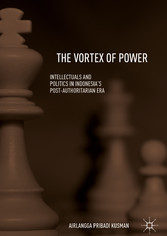Suche
Lesesoftware
Info / Kontakt
The Vortex of Power - Intellectuals and Politics in Indonesia's Post-Authoritarian Era
von: Airlangga Pribadi Kusman
Palgrave Macmillan, 2018
ISBN: 9789811301551 , 272 Seiten
Format: PDF
Kopierschutz: Wasserzeichen



Preis: 64,19 EUR
eBook anfordern 
Mehr zum Inhalt

The Vortex of Power - Intellectuals and Politics in Indonesia's Post-Authoritarian Era
This book explores the role of intellectuals and governance processes in post-authoritarian Indonesia. Focusing on East Java, the author argues that intellectuals have played an increasingly direct and practical role in the exercise of governance at the local level of Indonesian politics.
The book provides insights into how the collaboration between intellectuals and local politico-business elites has shaped good governance and democratic institution-building, validating power structures that continue to obstruct political participation in the country. In addition, the book also delves into the contribution of local intellectuals in resolving the contradictions between technocratic ideas and governance practices, in the interest of local elites.
Empirical studies included in the book add to the broader literature on the social role of intellectuals, highlighting their role as not just defined by their capacity to produce and circulate knowledge, but also by their particular position in concrete social and political struggle. The author also explores the manner in which relationships between intellectuals, business and political elites and NGOs in local political and economic practices, intersect with national-level contests over power and resources.
Airlangga Pribadi Kusman is a Lecturer in Politics, Faculty of Social and Political Sciences, Airlangga University. He is also the Director of CSCS (Centre for Statecraft and Citizenship Studies), Airlangga University. He completed his PhD in Politics at Murdoch University's Asia Research Centre. His research interests include governance studies, political economy of development, civil society and social movement studies, politics and religion studies, local politics studies and democratization studies.
This book explores the role of intellectuals and governance processes in post-authoritarian Indonesia. Focusing on East Java, the author argues that intellectuals have played an increasingly direct and practical role in the exercise of governance at the local level of Indonesian politics.
The book provides insights into how the collaboration between intellectuals and local politico-business elites has shaped good governance and democratic institution-building, validating power structures that continue to obstruct political participation in the country. In addition, the book also delves into the contribution of local intellectuals in resolving the contradictions between technocratic ideas and governance practices, in the interest of local elites.
Empirical studies included in the book add to the broader literature on the social role of intellectuals, highlighting their role as not just defined by their capacity to produce and circulate knowledge, but also by their particular position in concrete social and political struggle. The author also explores the manner in which relationships between intellectuals, business and political elites and NGOs in local political and economic practices, intersect with national-level contests over power and resources.




